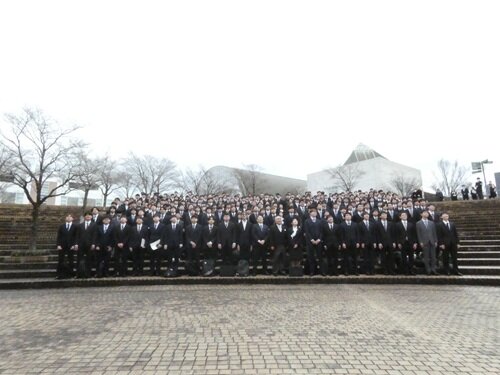
The University of Aizu AY2025 entrance ceremony was held on Wednesday, April 2, 2025. A total of 354 new students, 244 to the undergraduate school, 102 to master' s program, and 8 to the doctoral program were admitted by President Tsukahara. At the ceremony, congratulatory addresses by the Governor of Fukushima, Chairperson of Fukushima Prefectural Assembly, and Aizuwakamatsu City Mayor were delivered. After the addresses, Mr. TAKASHIMA Taiki and Ms. Murota Ayaka each pledged on behalf of the new students admitted to the undergraduate school and the graduate school respectively.
Congratulations on your admission to the University of Aizu. Today we welcome 354 new students, including 244 to our undergraduate school, 102 to our master's program, and 8 to our doctoral program. It is my great pleasure to welcome all of you taking your first steps as new members of the University of Aizu.
Not a day goes by that we don't see words AI, Big Data, IoT, and self-driving cars, and these have already become an indispensable part of our daily lives. These technologies are part of information and communication technology (ICT,) which is the exact subject you will study at our university. Today, ICT is not limited to computers and communications technology. Rather, it enriches human lives in everything ranging from daily life to advanced medicine and space exploration, and is indispensable in paving the way to the future.
With the 2024 Nobel prizes in Physics and Chemistry both awarded for AI-related research, it has become increasingly clear that AI is causing a major upheaval in the fundamental sciences, and is at the same time having an immeasurable impact on society as a whole.
It is within this context that the UoA has brought excellent faculty and students together from around the world since its establishment. And their various achievements have rapidly increased domestic and international recognition of the University. As a result, we are now also attracting attention from fields outside informatics.
Our achievements range from community-based projects, such as the use of AI to prevent damages caused by bears and other wild animals, to the recent taking of images with the multi-band spectrographic camera on the Smart Lander for Investigating Moon, or SLIM, as well as the analysis of these images. As demonstrated by UoA faculty members working in this space mission, their achievements extend to space exploration.
As science and technology advances and the social circumstances of the era change, so too have changed the knowledge and skills required of individuals. However, I believe that the learning process is largely universal and unchanging. Nobel laureate author OE Kenzaburo described the learning process as having three stages; "to know," "to understand," and "to realize." To quote Oe; "'To know' is to be taught knowledge. 'To understand' is to be able to use that knowledge.' 'To realize' requires deepening that understanding by repeating the first two steps until you are able to break through novel challenges on your own." Research, the activity through which new things are created, is nothing more than the repetition of this process. Looking back on my own life as a student and researcher, I have learned the importance of this process.
Technological progress in the ICT field has been remarkable, and generative AI and other technologies are rapidly penetrating society. I hope you will engage in learning that gets to the essence of things based on knowing, understanding, and realizing.
Learning requires hard work and perseverance. Please pursue your daily studies with a belief that a future of your own lies beyond your learning, and ambitiously polish your intelligence and humanity.
I will conclude by expressing my hope that all of you will acquire a broad education and an international outlook, and grow into talents capable of global success.
Once again, congratulations to all of you enrolling at our university today.
April 2, 2025
TSUKAHARA Tsuneo, President, the University of Aizu


